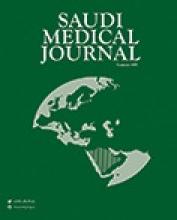Abstract
OBJECTIVE: Organ transplantation is successful. The main challenge in the Kingdom of Saudi Arabia (KSA) and elsewhere continues to be organ shortage. This shortage was not resolved by utilization of living donors. Previous studies indicate that there is underreporting of brain death cases, lack of completion of documentation process, poor medical care in some instances and finally high refusal rate for consent. In order to put this problem in perspective and find a solution, we initiated a collaborative project between 4 hospitals in Riyadh, KSA and The Saudi Center for Organ Transplantation. The initial result of this project is presented in this article.
METHODS: A donor team was formed to deal and facilitate the logistical aspect of donation in the 3 main Ministry of Health hospitals in Riyadh. Data with regard to the number of donors reported, documentation and success rate were recorded over 3-months (October 2003 to December 2003) and compared with the preceding 9 months.
RESULTS: During the period from January 2003 to September 2003, the total number of case reported to the Saudi Center for Organ Transplantation in Riyadh region, was 94. Only 53% were fully documented. Families were approached in 45 of these 50 cases in terms of donation and consent was obtained in 15. However, the number harvested was only 10 (11% yield from total number reported). During the period from October 2003 until the end of December 2003, the total number of cases reported from 3 hospitals was 19. Seventeen (90%) of them were documented. The families were approached in 16 cases and consent was obtained in 6. All 6 (32%) donors were harvested.
CONCLUSION: The above result clearly indicates that a donor team supporting the intensive care unit (ICU) can improve the donation. It is expected that application of a similar project to more ICUs in KSA will have a substantial positive impact on the rate of organ donation.
- Copyright: © Saudi Medical Journal
This is an open-access article distributed under the terms of the Creative Commons Attribution-Noncommercial-Share Alike 3.0 Unported, which permits unrestricted use, distribution, and reproduction in any medium, provided the original work is properly cited.






